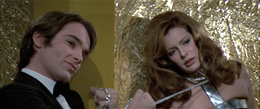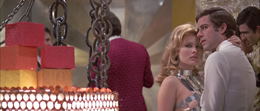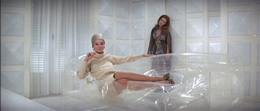
Color, 1969, 130/115/92m.
Directed by Radley Metzger
Starring Daniele Gaubert, Nino Castelnuovo, Eleanora Rossi-Drago, Roberto Bisacco, Silvana Venturelli, Massimo Serato, Zachary Adams, Philippe Forquet
Arrow (Blu-Ray & DVD) (UK R0 HD/PAL) / DTS-HD Mono, Cult Epics (Blu-Ray & DVD) (US R0 HD/NTSC), e-m-s (Germany R2 PAL) / WS (2.35:1) (16:9), First Run, Image (US R1 NTSC), Umbrella (Australia R4 PAL) / WS (2.35:1)
 In a glossy, futuristic, and very swinging version of Rome, the houses are filled only with the rich, bored, and decadent who stay up late partying till dawn. Into this kinky universe stumbles the romantic Armand (Castelnuovo from The Umbrellas of Cherbourg and Strip Nude for Your Killer), whose father (Don't Look Now's Serato) provides him with a lavish lifestyle in exchange for control over his life. Armand is offered his pick of the ladies for a companion, and against the advice of his bisexual best friend Gasttion (Torso's Bisacco), he sets his sights on Marguerite (the lovely Gaubert). A true party girl, Marguerite flits from one lover to another amidst wild parties and bouts of IV drugs. Obviously aware that her days are numbered, she resists Armand's desire to form a true relationship, but eventually their passion consumes them. However, reality comes crashing down as manipulation and betrayal threaten to ruin their relationship forever.
In a glossy, futuristic, and very swinging version of Rome, the houses are filled only with the rich, bored, and decadent who stay up late partying till dawn. Into this kinky universe stumbles the romantic Armand (Castelnuovo from The Umbrellas of Cherbourg and Strip Nude for Your Killer), whose father (Don't Look Now's Serato) provides him with a lavish lifestyle in exchange for control over his life. Armand is offered his pick of the ladies for a companion, and against the advice of his bisexual best friend Gasttion (Torso's Bisacco), he sets his sights on Marguerite (the lovely Gaubert). A true party girl, Marguerite flits from one lover to another amidst wild parties and bouts of IV drugs. Obviously aware that her days are numbered, she resists Armand's desire to form a true relationship, but eventually their passion consumes them. However, reality comes crashing down as manipulation and betrayal threaten to ruin their relationship forever.
 The '60s turned out some delicious cocktails of elegant erotica, but Camille 2000 is a splashy epic unlike any other; filling its two hours with gorgeous pop art visuals captured in magnificent three-strip Technicolor, it's a feast of visual style, sensitive performances, and rapturous music that will tickle the fancy of anyone who loves retro-Euro cinema. Director Radley Metzger had played around with adapting classic stories into a modern context before (Carmen, Baby), and here he transformed a classic Alexandre Dumas Fils romance best known as a Greta Garbo tearjerker vehicle into a sumptuous, jet-setting tragedy filled with beautiful, self-centered people whose nobler virutes are invariably destined to clash with their stations in life.
While Camille 2000 is packed with memorable images and haunting scenes (including a remarkable obsession with mirrors), the highlight is undoubtedly a ten minute party sequence in which the voluptuos Olympe (Venturelli from Metzger's The Lickerish Quartet) vies for Armand's affections at a lavish underground party decked out with a gold prison motif; arguably the greatest setpiece in the Metzger canon, the inevitable sex scene is powerful and erotic, tragic and delirious at the same time, with much of its power owed to the fantastic score by Pierro Piccioni, one of the finest ever composed for an Italian film. The astonishing locations and production design constantly delight the eye while perfectly evoking the film's period and skewed outlook; likewise, Metzger's keen editing sense is in fine form, particularly in the startling moment when he cuts from a syringe plunging into skin to a close up of drums being played in a music combo. Also, here Metzger begins to explore the playful cinematic self-awareness (the film begins with a clapboard appearing over the opening shot) which eventually exploded in several of his subsequent films.
The '60s turned out some delicious cocktails of elegant erotica, but Camille 2000 is a splashy epic unlike any other; filling its two hours with gorgeous pop art visuals captured in magnificent three-strip Technicolor, it's a feast of visual style, sensitive performances, and rapturous music that will tickle the fancy of anyone who loves retro-Euro cinema. Director Radley Metzger had played around with adapting classic stories into a modern context before (Carmen, Baby), and here he transformed a classic Alexandre Dumas Fils romance best known as a Greta Garbo tearjerker vehicle into a sumptuous, jet-setting tragedy filled with beautiful, self-centered people whose nobler virutes are invariably destined to clash with their stations in life.
While Camille 2000 is packed with memorable images and haunting scenes (including a remarkable obsession with mirrors), the highlight is undoubtedly a ten minute party sequence in which the voluptuos Olympe (Venturelli from Metzger's The Lickerish Quartet) vies for Armand's affections at a lavish underground party decked out with a gold prison motif; arguably the greatest setpiece in the Metzger canon, the inevitable sex scene is powerful and erotic, tragic and delirious at the same time, with much of its power owed to the fantastic score by Pierro Piccioni, one of the finest ever composed for an Italian film. The astonishing locations and production design constantly delight the eye while perfectly evoking the film's period and skewed outlook; likewise, Metzger's keen editing sense is in fine form, particularly in the startling moment when he cuts from a syringe plunging into skin to a close up of drums being played in a music combo. Also, here Metzger begins to explore the playful cinematic self-awareness (the film begins with a clapboard appearing over the opening shot) which eventually exploded in several of his subsequent films.
 As with many of Metzger's other films, Camille 2000 was critically dismissed upon its release but soon regarded as a high point of its kind. (A young Roger Ebert, way before he became an excellent writer, gave it a particularly innacurate and baffling thrashing.) The film was circulated in a variety of versions around the world including two different endings and a variety of different censorship wranglings. Some American prints conclude abruptly with the tragic hospital finale, while others feature a sequence with Armand, Olympe, and company partying into oblivion at night in a circular nod to the film's opening. This scene was repositioned about thirty minutes earlier in some prints, but it really feels right as the closing moments before the credits roll. Meanwhile in Italy all of the references and visuals involving drug addiction were trimmed, while in Germany the film was hacked down the barely over 90 minutes including the removal of several seconds at the heads and tails of almost every scene. However, the German version also included a minute-long extension of Marguerite and Armand's first love scene with her performing implied oral sex, a bit featured in no other country's prints.
As with many of Metzger's other films, Camille 2000 was critically dismissed upon its release but soon regarded as a high point of its kind. (A young Roger Ebert, way before he became an excellent writer, gave it a particularly innacurate and baffling thrashing.) The film was circulated in a variety of versions around the world including two different endings and a variety of different censorship wranglings. Some American prints conclude abruptly with the tragic hospital finale, while others feature a sequence with Armand, Olympe, and company partying into oblivion at night in a circular nod to the film's opening. This scene was repositioned about thirty minutes earlier in some prints, but it really feels right as the closing moments before the credits roll. Meanwhile in Italy all of the references and visuals involving drug addiction were trimmed, while in Germany the film was hacked down the barely over 90 minutes including the removal of several seconds at the heads and tails of almost every scene. However, the German version also included a minute-long extension of Marguerite and Armand's first love scene with her performing implied oral sex, a bit featured in no other country's prints.
 Cult Epics' acquisition of the rights for some of Metzger's finest titles in 2011 had to include this one, and thankfully their treatment does it justice. The HD master created from the original negative is leaps and bounds above any other releases, with extremely natural skin tones, perfectly rendered reds and blues, and no visible digital tinkering with the picture. The opening wide shots look a bit gritty and some minor flecks and specks are visible, but overall it's a majestic and much-needed restoration of a film that desperately needs to be seen on its best behavior. The mono audio (lossy Dolby Digital) sounds okay, with the Gaubert and Castelnuovo (among others) providing their real voices in English. Their Blu-Ray edition is actually available in two variants with the same extras: the theatrical American cut (just under two hours and also included in the three-title Radley Metzger's Erotica Psychedelica set) and a newly-created extended version, which clocks in at 130 minutes. There's an argument to be made for either one as the pacing of the theatrical version is definitely tighter and more friendly to newcomers, but the extended one is definitely the version fans will go to for repeated viewings as it incorporates all of the cut scenes from the Australian release (but looking far, far better here) along with the extra German erotic snippet as well. This is also the only English-language version with the full presentation of the scene in which Armand is invited to Olympe's party, whose opening few seconds were confusingly hacked off due to print damage in First Run's version.
Cult Epics' acquisition of the rights for some of Metzger's finest titles in 2011 had to include this one, and thankfully their treatment does it justice. The HD master created from the original negative is leaps and bounds above any other releases, with extremely natural skin tones, perfectly rendered reds and blues, and no visible digital tinkering with the picture. The opening wide shots look a bit gritty and some minor flecks and specks are visible, but overall it's a majestic and much-needed restoration of a film that desperately needs to be seen on its best behavior. The mono audio (lossy Dolby Digital) sounds okay, with the Gaubert and Castelnuovo (among others) providing their real voices in English. Their Blu-Ray edition is actually available in two variants with the same extras: the theatrical American cut (just under two hours and also included in the three-title Radley Metzger's Erotica Psychedelica set) and a newly-created extended version, which clocks in at 130 minutes. There's an argument to be made for either one as the pacing of the theatrical version is definitely tighter and more friendly to newcomers, but the extended one is definitely the version fans will go to for repeated viewings as it incorporates all of the cut scenes from the Australian release (but looking far, far better here) along with the extra German erotic snippet as well. This is also the only English-language version with the full presentation of the scene in which Armand is invited to Olympe's party, whose opening few seconds were confusingly hacked off due to print damage in First Run's version.